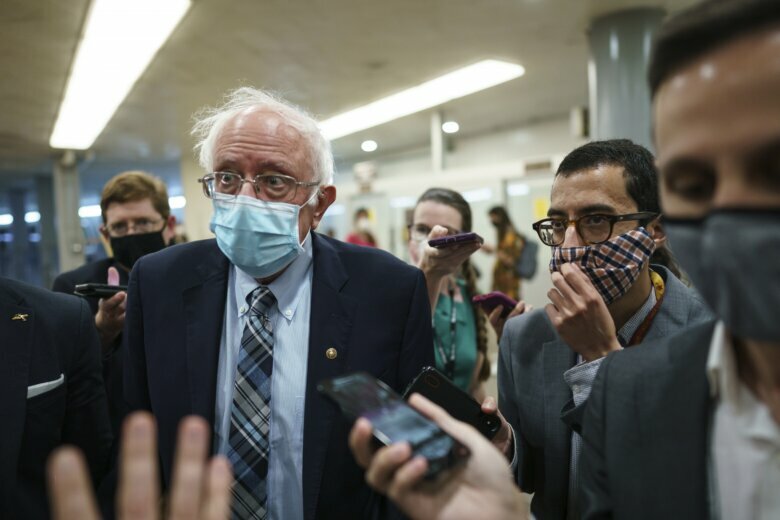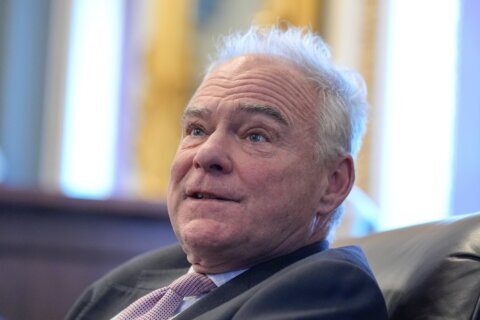
Progressives in Congress are finally armed with the leverage they have craved for years and sense an existential moment for their movement.
In the fight with Democratic Party moderates over President Joe Biden’s $4 trillion agenda, the left’s long-held dreams of sweeping reform — most clearly embodied in independent Vermont Sen. Bernie Sanders’ White House runs — are bolstered by new liberal power to make demands on Capitol Hill.
For the first time in decades, calls by progressives for vastly expanded health care, free pre-kindergarten and community college as well as cheaper prescription drugs are not just fodder for hopeless activist campaigns. They are tantalizingly close to reality.
So the current impasse between progressive House Democrats and centrist lawmakers like Sens. Joe Manchin of West Virginia and Kyrsten Sinema of Arizona adds up to more than the usual Washington intra-party squabble. It may be a defining confrontation that will determine the future of liberal politics in a brief window of opportunity for generational change.
It is therefore not surprising that House Speaker Nancy Pelosi’s vaunted mastery of her own caucus has so far left her unable to solve a showdown that baffles outsiders since it could destroy Biden’s entire domestic agenda — and with it, the Democrats’ case for holding power in 2022 and beyond.
House progressives dug in on Tuesday over their refusal to pass Biden’s signature $1.2 trillion bipartisan infrastructure bill unless moderate Senate Democrats sign off on a $3.5 trillion bill to transform the economy in favor of working Americans.
“We will hold the line and vote it down,” Michigan Rep. Rashida Tlaib said of the infrastructure bill on Twitter, adopting a strategy that could crush Biden’s hopes of going into midterm elections with a rare law passed by both Democrats and Republicans.
But Manchin says he’ll never vote for a $3.5 trillion behemoth that he doubts is needed and worries will damage his coal producing state with climate change reforms. He is also balking at progressive House Democrats forcing his hand.
“Holding one hostage over the other is not fair and not right. It’s not good for the country,” Manchin said after visiting the White House, with the knowledge that in a 50-50 Senate the bill’s fate could rest in his hands.
In the recent past, bald political realities might have already caused progressives to fold for the common good of Biden’s agenda, especially given the President’s desperate need for a win after a rough political patch. But a growing sense of impatience in the Democratic grassroots and the unity of the progressive caucus at a time when Pelosi lacks a dominant working majority means the left is feeling emboldened. A sense that a vital moment is at hand for the movement is also exacerbated by recent reversals — like a Senate parliamentary ruling that immigration reform cannot be part of the spending bill and the conservative Supreme Court allowing a law severely limiting abortion in Texas to take effect.
The consequences of power
Unlike on some occasions in the past, progressives on Capitol Hill have benefited in this campaign from steady leadership and have not been solely represented by their most high-profile members, like New York Rep. Alexandria Ocasio-Cortez, an effective communicator who also stirs waves of controversy.
Washington Democratic Rep. Pramila Jayapal, the chair of the House Progressive Caucus, has kept open channels with the House Democratic leadership and the White House, and has avoided unmendable spats with more moderate House members who fear the failure of the infrastructure bill could cost them their seats in November 2022.
On a private Progressive Caucus conference call on Tuesday, Jayapal backed the idea of waiting for a fully drafted Senate reconciliation spending bill and commitments that there will be no amendments before agreeing to vote for infrastructure, a source told CNN’s Annie Grayer. Some progressives want the spending bill to pass the Senate before moving forward.
But at some point, progressives may have to face the consequences of their new power within the broader Democratic caucus. If it turns out that their demands are impossible for the Senate, Biden and Pelosi to deliver, what then? Are the members willing to effectively torch Biden’s entire domestic agenda? Will they accept a smaller spending bill if Manchin and Sinema sign on in the knowledge that it could still bring enormous benefits to their constituents?
The biggest question is if progressives are willing to mortally wound the Biden presidency at a time when Republicans are readying their midterm attack lines and ex-President Donald Trump is planning what appears to be an attempt to restore his anti-democratic rule in the White House.
Their dilemma is one that every political movement faces sooner or later — whether to dilute its ideals in favor of pragmatic success or to stand firm on principle even if that destroys the hope of incremental success.
Conventional wisdom in Washington suggests that splits between warring factions always look the most intense in the hours before a resolution as each side deploys maximum leverage to draw out whatever concessions they can.
But unless the House progressives and the Senate moderates — some of whom spent Tuesday shuttling between Capitol Hill and the White House — are bluffing, a resolution still seems distant as a deadline of Thursday’s planned vote on the infrastructure bill looms closer.
In fact, Rep. Mark Pocan, a Wisconsin progressive, told CNN’s Jake Tapper: “I don’t think there’s going to be a vote on Thursday. We might get this done the following week.”
The culmination of Bernie Sanders’ career
One way to understand the spending bill that has been embraced by Biden is as the culmination of Sanders’ life’s work and two insurgent, but surprisingly successful, campaigns.
For decades, the godfather of the modern progressive movement labored in the political wilderness as Democrats coalesced behind the centrist liberalism of the Bill Clinton and Barack Obama years. There were wins for progressives — the Affordable Care Act, for instance, took America closer to the principle of universal health care — but it fell short of the single payer system many on the left support. Biden’s $1.9 trillion Covid relief bill earlier this year also won his former Democratic presidential rival’s strong support as a strong blow against poverty.
The Sanders presidential campaigns in 2016 and 2020 electrified progressives — either pushing Democrats to the left or taking advantage of a new audience more receptive to the democratic socialist’s ideas.
The movement was not enough for Sanders to win the Democratic nomination — the victories of Biden and 2016 nominee Hillary Clinton showed that while it is a force, the left even now lacks the power to dominate the party, especially outside the House.
But after decades of endless rallies, marches and articles, the Sanders campaigns gave the senator something he had lacked since earlier shifts as the mayor of Burlington, Vermont: Power.
There is a reason why Sanders keeps calling the larger measure “the most significant piece of legislation for working people since the Great Depression.” In effect, as Senate Budget Committee chairman, Sanders is effectively writing Biden’s domestic political legacy — assuming he can get most of his $3.5 trillion bill, a compromise from his earlier $6 trillion wish list, into law.
The package reads almost exactly like one of the campaign speeches that Sanders delivered day after day in which he lambasted “millionaires and billionaires” in his thick Brooklyn accent at countless campaign stops.
Funded by a hike in taxes for corporations and the rich, the bill seeks to cut child poverty in half with tax credits and introduces universal free pre-K for 3- and 4-year-old kids. It allows Medicare to negotiate prescription drugs prices with big pharmaceutical companies. The bill would provide hearing and dental benefits for seniors, paid family leave and medical leave and train more doctors and nurses for underserved areas.
Sanders also wants to combat the homelessness crisis by investing in affordable housing. He would tackle student debt by offering two years of free community college. And he takes aim at the climate crisis by trying to seed a new energy-efficient economy.
If even most of this agenda is preserved in any final law, the 80-year-old Sanders will leave a genuine imprint on American politics and society, one that few Washington observers would have thought possible six years ago.
So, it was significant that the Senate Budget Committee chairman chose Tuesday to make his most forceful play yet in the debate over the two bills as tensions rise over on the House side of Capitol Hill.
“What I do know is that if the infrastructure bill is passed, alone in the House, we lose whatever leverage we now have,” he said.








